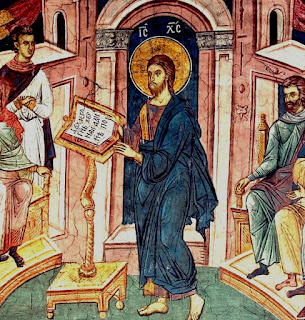The Truth Shall Make You Free
THIRD SUNDAY IN ORDINARY TIME (C)
click here for readings
The Spirit of the Lord is upon me,
because he has anointed me
to bring glad tidings to the poor.
He has sent me to proclaim liberty to captives
and recovery of sight to the blind,
to let the oppressed go free,
and to proclaim a year acceptable to the Lord.
It is possible to misuse freedom. The fact that a falsehood is freely chosen does not make the falsehood into a truth. I can freely write on my math test that 2 + 2 = 5, but I will still fail the test. So it is with the moral life. Individual autonomy is necessary for the moral life — John Paul II asserts, “there can be no morality without freedom” (VS 34) — but that autonomy is not itself the highest good. This is the lie behind the slogan “Pro-Choice.” It suggests that mere freedom to choose supersedes all other concerns, even if that freedom is being used to choose death and destruction. This is the trap suffered by all those who choose behavior which leads to addiction (drugs, alcohol, pornography). They discover, to their dismay, that they have chosen slavery.
The Catholic Church reminds us that freedom has a higher purpose, which is to allow us to choose the good. “Although each individual has a right to be respected in his own journey in search of the truth, there exists a prior moral obligation, and a grave one at that, to seek the truth and to adhere to it once it is known” (VS 34).
How are we to know what is good and true? Certainly we can and should make use of our reason. Just as the purpose of our eyes is to see and the purpose of our ears is to hear, our intellect has a purpose. We have rational minds so that we can seek out the truth. But our reason is imperfect. Our intellect is limited. Our freedom to choose the good is hampered by our own fallen nature.
This is precisely why Jesus is the great liberator. Jesus not only possess a perfect human nature, untainted by sin, but He is also fully divine, one in essence with God the Father, “who alone is good, knows perfectly what is good for man, and by virtue of His very love proposes this good to man in the commandments” (VS 35). God made us and knows perfectly what is good for us. His laws therefore are not put in place to satisfy some arbitrary whim of the Divine, but to lead us toward our own ultimate good.
Our psalm for this Sunday’s Mass acclaims, “The law of the Lord is perfect… The decree of the Lord is trustworthy… The precepts of the Lord are right… The command of the Lord is clear… The ordinances of the Lord are true…” (Ps 19). St. John Paul II likewise affirms, “God’s law does not reduce, much less do away with human freedom; rather it protects and promotes that freedom” (VS 35).
There is no better guide to help us use our freedom in pursuit of truth than Jesus Himself. The psalmist says, “The command of the Lord is clear, enlightening the eye” (Ps 19:8). The light of Christ brings sight to the blind, just as He promised, by allowing us to see more clearly the good, the true, and the beautiful.
“By submitting to the law,” John Paul II writes, “freedom submits to the truth of creation. Consequently one must acknowledge in the freedom of the human person the image and the nearness of God, who is present in all” (VS 41). When we freely follow the good, we become like God; we allow ourselves to be formed more perfectly to His image.
To follow Jesus is to be led out of captivity and into freedom — true freedom to become what you were meant to be.
“You will know the truth, and the truth will make you free” (Jn 8:32).

